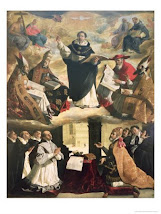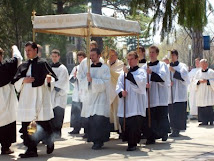Fr. Hauser implies four guidelines that are central to developing the skill of discernment in daily life/handling obstacles to the Spirit. All are equally quantifiable however, the fourth, trust in the Spirit: grace in us is stronger than sin in us—we have been redeemed (Hauser, S.J., 1995, 221) expresses more within the rational towards discernment.
We sometimes (more often than not) tend to forget that God does love us and wants us to succeed in everything that we do. In turn, God has placed before us different paths to follow, some are clear others have obstacles and it is more often than not, during the path with the obstacles we tend to forget that “grace in us is stronger than sin in us.” Discernment is not a clear and concise path, it is a path full of obstacles and wayward directions to choose from, so this particular point is of most interest to me and my personal discernment.
The transformation of our inner selves is a lifetime journey and we must be patient. The Lord asks only for fidelity to the journey; we will be transformed in God’s good time. God willed the human condition, which includes human brokenness. But God wills brokenness only because it is a unique occasion for experiencing the power redemption (Hauser, S.J., 1995, 221). Many of our weaknesses never go away, be they physical liabilities or moral temptations. They are handled best when we name them—approaching them even with a sense of humor—and refuse to respond to them, realizing that without them we would be deprived of occasions for experiencing the grace of our redemption (Hauser, S.J., 1995, 222).
Reference:
Hauser, R. J.S.J. (1995). Each Mortal Thing Does One Thing and the Same--Selves: An Approach to Christian Discernment. In R. J. Wicks (Ed.), Handbook of Spirituality for Ministers (pp. 207-228). New York: Paulist Press.
Christian Education
"Since all Christians have become by rebirth of water and the Holy Spirit a new creature(8) so that they should be called and should be children of God, they have a right to a Christian education. A Christian education does not merely strive for the maturing of a human person as just now described, but has as its principal purpose this goal: that the baptized, while they are gradually introduced the knowledge of the mystery of salvation, become ever more aware of the gift of Faith they have received, and that they learn in addition how to worship God the Father in spirit and truth (cf. John 4:23) especially in liturgical action, and be conformed in their personal lives according to the new man created in justice and holiness of truth (Eph. 4:22-24); also that they develop into perfect manhood, to the mature measure of the fullness of Christ (cf. Eph. 4:13) and strive for the growth of the Mystical Body; moreover, that aware of their calling, they learn not only how to bear witness to the hope that is in them (cf. Peter 3:15) but also how to help in the Christian formation of the world that takes place when natural powers viewed in the full consideration of man redeemed by Christ contribute to the good of the whole society.(9) Wherefore this sacred synod recalls to pastors of souls their most serious obligation to see to it that all the faithful, but especially the youth who are the hope of the Church, enjoy this Christian education."
Gravissimum Educationis
Gravissimum Educationis
Saturday, March 21, 2009
Subscribe to:
Post Comments (Atom)




































No comments:
Post a Comment